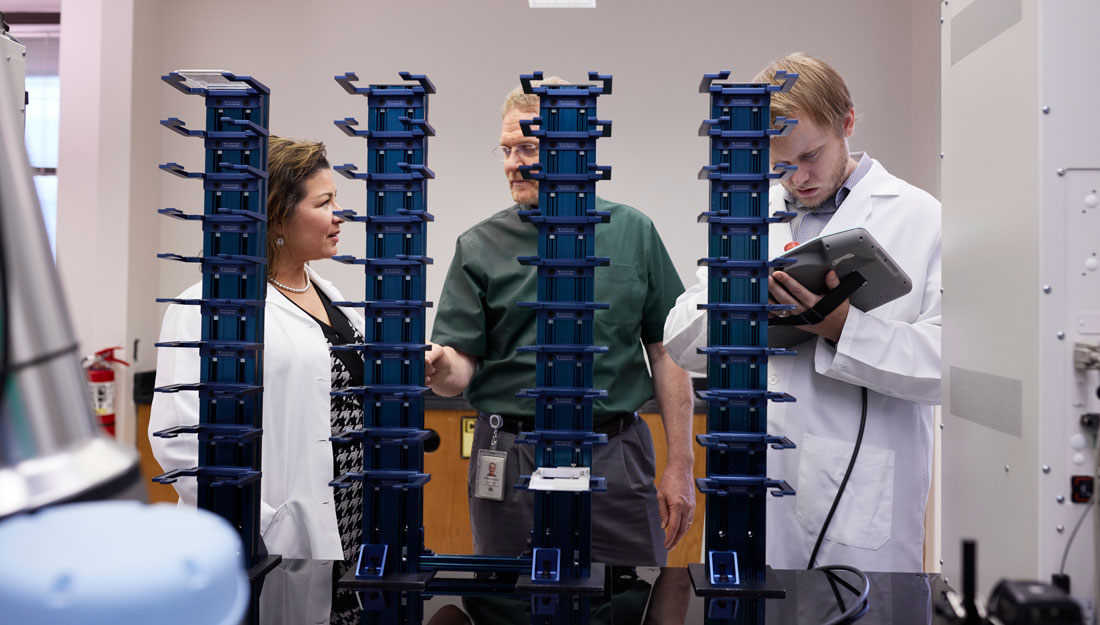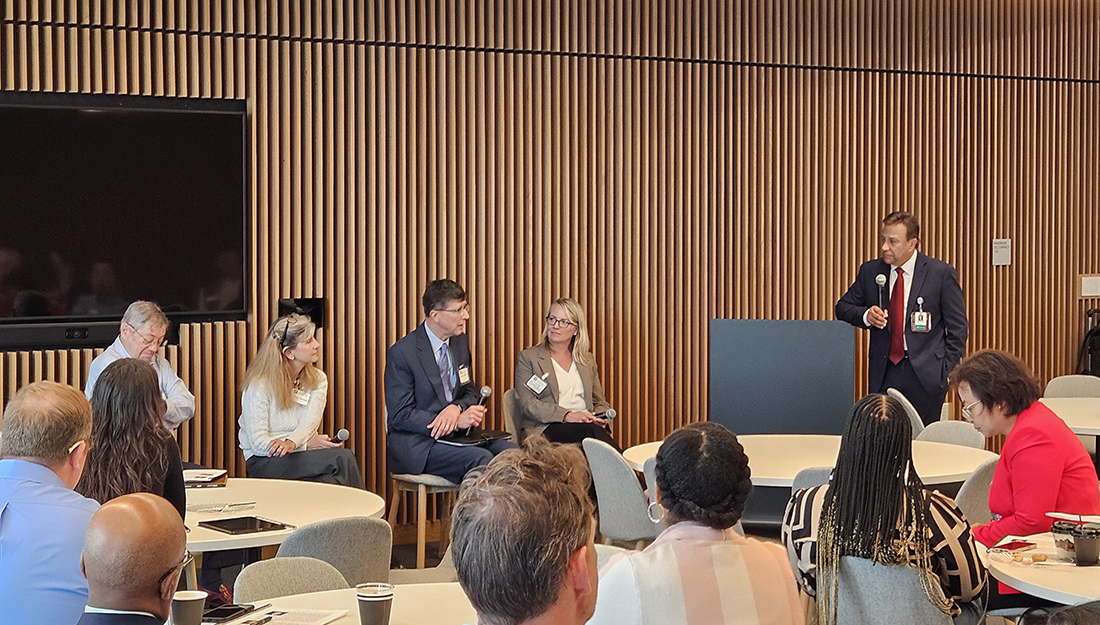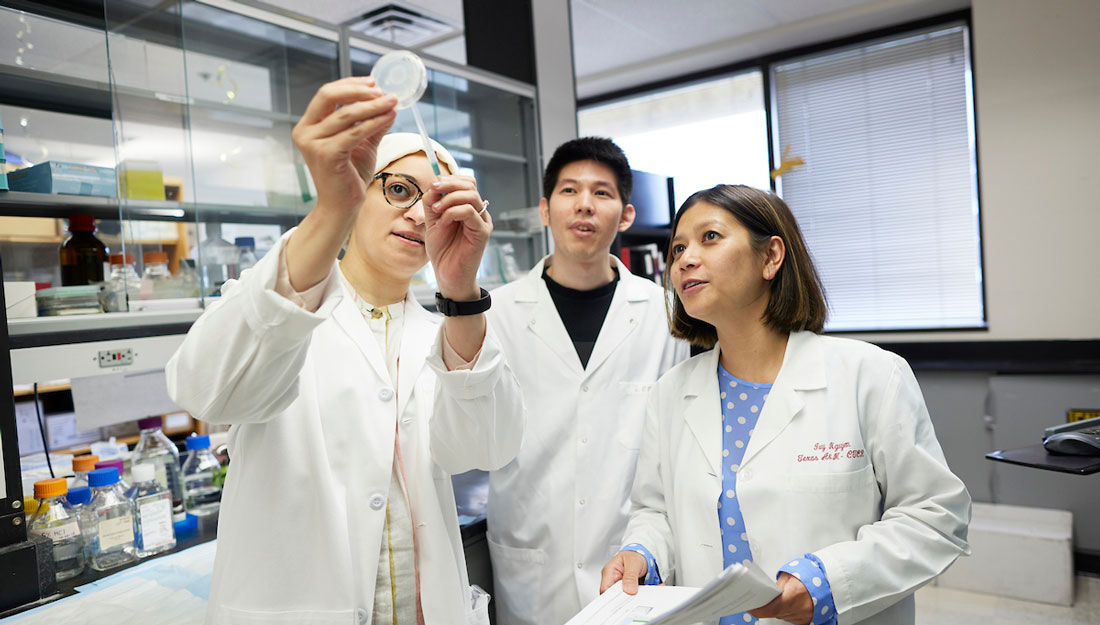- Lindsey Hendrix
- Biosciences & Technology, Medicine, Public Health, Research, Show on VR homepage
Texas A&M Health receives $5.47 million from Cancer Prevention and Research Institute of Texas
Awards support research and care in the fight against cancer

Clifford Stephan in the Texas A&M Health Institute of Biosciences and Technology, and his multidisciplinary team received the largest of the four grants, a $3.97 million core facility grant for the Micro-physiological Lead Optimization and Toxicity Screening core facility (MLOTS).
The Cancer Prevention and Research Institute of Texas (CPRIT) recently awarded grants totaling nearly $5.5 million to four faculty members at the Texas A&M University Health Science Center (Texas A&M Health). The grants are among 72 new statewide awards totaling more than $142 million that CPRIT recently announced.
“It is an honor to see so many Texas A&M Health faculty recognized through these distinguished CPRIT grants and the support it provides to all the families and lives impacted by cancer,” said Jon Mogford, PhD, chief operating officer and senior vice president for Texas A&M Health. “Here at Texas A&M, we are committed to developing innovations that aid in our fight against cancer and through this type of investment will continue to rapidly translate discoveries into prevention and early detection for Texans and people everywhere.”
Accelerating cancer drug development
Clifford Stephan, PhD, research associate professor in the Center for Translational Cancer Research at the Texas A&M Health Institute of Biosciences and Technology, and his multidisciplinary team received the largest of the four grants, a $3.97 million core facility grant for the Micro-physiological Lead Optimization and Toxicity Screening core facility (MLOTS). This funding will provide Texas’ cancer researchers with access to a new program designed to support cancer-related drug discovery research.
A major problem for researchers developing new therapeutics is that very often new drugs exhibiting promising therapeutic activity against a specific disease target fail to advance to clinical application because of unanticipated toxicity, poor activity in vivo or other pharmacologic liabilities. In traditional strategies for drug discovery these adverse properties are often not discovered until very late in the drug development process. As a result, a huge amount of time, effort and resources may be invested in drugs that ultimately fail to reach the clinic.
The new MLOTS core facility will use sophisticated test systems to provide cancer researchers from Texas A&M, other academic institutions and biotech companies from across Texas with a “fail early” new leads evaluation system. The sensitivity of these advanced micro-physiological test systems, such as tissue-on-a-chip systems and tumor organoids, will allow drug discovery researchers to make critical “go/no-go” decisions early in the development process. Ultimately, MLOTS will accelerate the advancement of the most promising cancer therapeutics into both pre-clinical development and clinical testing.
The MLOTS team includes Shreya Raghavan, PhD, from the College of Engineering, Mansoor Khan, PhD, RPh, from the College of Pharmacy and Ke Zhang, director of the Rigor & Reproducibility Core at the Institute of Biosciences and Technology.
Increasing access to lung cancer prevention services
Jason McKnight, MD, clinical assistant professor at the Texas A&M College of Medicine, received $999,947 for his project titled “Increasing Accessibility to Smoking Cessation and Lung Cancer Screening Services for Low-Income/Uninsured Texans.” The overall goal of his team’s project is to provide lung cancer prevention education, support smoking cessation activities, perform low-dose lung CT scans for lung cancer screening, and provide patient navigation across the continuum of care to qualifying older, low-income residents of 13 Texas counties, including nine rural counties and 10 classified as whole-county medically underserved areas.
Lung cancer is the most commonly diagnosed cancer for men and women combined, and the leading cause of cancer-related deaths in the United States and Texas, creating a public health burden that costs billions of dollars each year. The toll on lives is even more costly, as lung cancer accounts for almost one-fourth of all cancer-related deaths in the nation and the state.
Led by the College of Medicine and the School of Public Health, this project will serve a diverse population, largely aged 55 to 77 years, many in rural and underserved areas. The project incorporates components from an established lung cancer screening/early detection program at St. Joseph Regional Health Center, leverages existing well-established clinical and community partnerships, and incorporates community health workers for patient education and intake, barriers reduction, and navigation to services.
Engineering cancer-fighting smart cells
Yubin Zhou, MD, PhD, associate professor and ACS research scholar at the Institute of Biosciences and Technology, received a $250,000 High Impact/High Risk Research Award for his project titled “Tunable Epigenetic Remodeling to Modulate CAR T-Cell-Based Immunotherapy.” The goal of Zhou’s work is to engineer smart therapeutic T-cells to advance precision medicine by delivering durable and controllable cell-based immunotherapy against cancer.
Over the past five years, chimeric antigen receptor (CAR) T-cell based immunotherapy, also regarded as “living drugs” in the body, has achieved miraculous outcomes in certain patients with lymphoma and leukemia. However, CAR T-cell therapy still faces challenges, partially because of severe side effects and its inability to achieve long-term therapeutic effects in some cancer patients.
To address these challenges, Zhou’s team proposes combining state-of-the-art chemical biology and protein engineering technologies to design improved CAR T-cells with higher efficacy and safety, which will be achieved through precise control over the epigenetic and metabolic regulatory pathways in therapeutic T-cells. Their study will open new avenues to engineer safer and more potent therapeutic immune cells to benefit both basic and translational studies on immunotherapy.
Zhou’s team at the Institute of Biosciences and Technology includes Nancy Huang, PhD, Guolin Ma, PhD, and Jia Li, PhD.
Targeting lymphatics to slow the spread of liver cancer
Sanjukta Chakraborty, PhD, assistant professor at the College of Medicine, received $250,000 for her project titled “Therapeutic Inhibition of Cholangiocarcinoma Progression by Targeting Tumor-Lymphatic Cross Talk.” Her research program is focused on understanding mechanisms that promote lymph node metastasis, or presence of tumor cells in the sentinel lymph nodes, a prognostic indicator of tumor aggressiveness and patient outcome. It has long been known that lymphatics play an active role in cancer metastasis. However, no FDA approved therapeutic exists that directly targets the interplay between tumor cells and lymphatic cells nor mechanisms that promote tumor lymphangiogenesis.
Cholangiocarcinoma (CCA) is an aggressive and rare form of liver cancer that precludes traditional therapies and has a dismal prognosis. Initial studies done by the research team identified specific molecules elevated in CCA patients that increased lymphangiogenesis and also mediated tumor-lymphatic crosstalk near the primary tumor site. In this project, specific FDA approved therapeutics will be evaluated for their effects on tumor draining lymph nodes and abrogating growth of new lymphatic vessels.
This cross-collaborative team is comprised of Chakraborty, Shannon Glaser, PhD, professor in the Department of Medical Physiology, and David Zawieja, PhD, Regents Professor and head of the Department of Medical Physiology.
Media contact: media@tamu.edu


